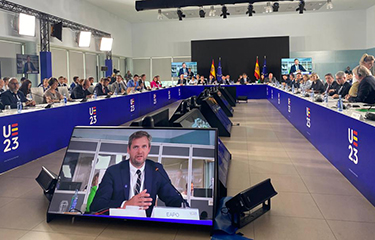EU barely reaches agreement on new nature restoration law, prompting worries over uneven enforcement

The European Union recently approved a contentious law that would entail member-states implementing restoration measures on at least 20 percent of Europe’s land and sea by 2030.
A revised draft of the E.U. Nature Protection Law (NRL) that included several amendments passed in a crunch vote – 336 votes in favor, 300 against, and 13 abstentions – in Strasbourg, France, on 12 July, 2023, moving on to trialogue negotiations under the guidance of the Spanish Presidency of the European Union, in advance of a final round of negotiations.
While proponents of the law lauded its goals of restoring wild areas and their biodiversity, some groups that opposed the law are worried that its enforcement will be uneven across the E.U. The European Association of Fish Producers Organisations (EAPO) is one such group, insisting that a level playing field is necessary across all marine space users to avoid disproportionate impacts.
“[EAPO] would like to insist on the need to limit both direct and indirect anthropogenic impacts on restoration areas,” EAPO President Esben Sverdrup said. “Lowering or stopping fishing pressure cannot guarantee effective restoration when the sea is in a critical state, as in the case of the Baltic Sea. We also question the level playing field dimension of the nature restoration plans. As individual member-states will be developing their own plans, a level playing field cannot be guaranteed.”
The European Parliament’s fisheries and agriculture committees rejected a previous draft of the NRL, calling the proposal ill-thought-out, unrealistic, and likely to have negative consequences.
EAPO, agreeing with the committees’ opposition to the initial draft, wants the final NRL to emphasize clarity in its approach to limiting marine environmental impacts, Sverdrup told SeafoodSource.
Sverdrup acknowledged this wouldn’t be easy, saying that in recent times there’s been “accrued pressure” on the maritime space, which has increasingly led to conflicts between longstanding players such as EAPO’s members, and newcomers, such as those trying to implement offshore wind projects.
“Differing from food production, the European Parliament’s position lists renewable energies as being of overriding public interest, meaning that wind farms, not fishing activities, can be set up in restoration areas,” Sverdrup said. “We [EAPO] see this as highly problematic because in this case, restoration measures are, in fact, limited only to restricting fishing activity and not dealing with the impacts of offshore renewable energies (ORE).”
Representing 28 producer organizations from nine member-states with approximately 10,000 vessels, 3.5 million metric tons (MT) of landings, and an estimated first-sale value of EUR 3 billion (USD 3.3 billion), EAPO maintains that “no one has a greater interest in a healthy and productive marine environment” than its members, who mainly include fishers relying on the ocean for their livelihoods.
Sverdrup said over the past 20 years and particularly since the ongoing restructuring of the E.U.’s fisheries control rules, Europe's fishing sector has greatly reduced its environmental impact, and fishing pressure is now at an all-time low.
The center-right European People's Party (EPP), the largest party formation in the European Parliament, also opposes the NRL, seeing it as a direct threat to the livelihoods of European fishers, farmers, and forest managers. Previously, EPP stated that the law’s legally binding targets would disrupt supply chains, decrease food production, and raise prices for everyday consumers.
Under the revised legislation, E.U. member-state governments must ...
Photo courtesy of EAPO



Share